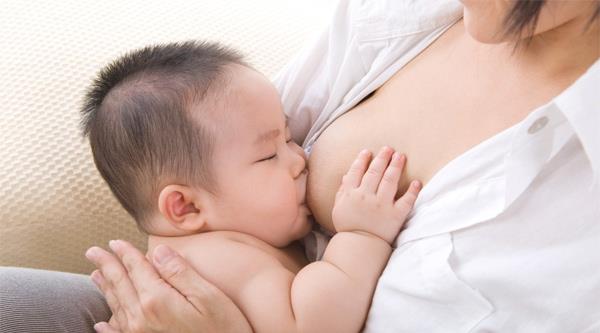Mothers giving birth to their first child often wonder whether teething can affect breastfeeding. The answer is “yes”, but most importantly how you deal with the discomfort brought on by teething
content
Feeding your baby properly
Pay attention to when your baby teething
What to do when the baby likes to bite?
The biggest concern of mothers is probably that the teething babies will love to bite. Many mothers even think about weaning when their baby comes to teething . However, this is not beneficial for the baby. As recommended by the World Health Organization (WHO), mothers should breastfeed exclusively for the first 6 months and should last until the baby is 1 year old or longer. So how should mom handle the problems that I'm wondering?

Breastfeeding during teething times, you will need to apply some tips to reduce discomfort for your baby and for yourself.
Feeding your baby properly
Regardless of whether the baby teething or not, when the baby latches on the breast properly , the baby's mouth will open wide and the gums will be away from the areola. Meanwhile, the baby's lower molars will be covered by the tongue and not in direct contact with the mother's breasts. Thus, the baby will not bite the mother. But if the baby only latches on the nipple, the possibility of biting the mother due to itching of the gums will occur.
Pay attention to when your baby teething
Experienced mothers all find that the challenge usually happens when the baby is teething, not when the teeth have come out completely. In fact, because during teething, babies often feel uncomfortable and sometimes, they will want to change their breastfeeding positions to reduce discomfort in areas that are swollen due to teething. To reduce discomfort for themselves, mothers should pay attention to when their baby teething. Keep breastfeeding properly. In addition, you can also apply some tips to reduce discomfort during these times:
Before breastfeeding:
Let your baby chew a cold cloth or a toy specifically designed for teething babies to satisfy the feeling of wanting to chew or bite.
If your child has already started eating foods, it is okay to offer him a firm and chilled food such as a toast or a piece of frozen fruit. However, with any option, you should pay attention to not choke or choke.
You can use your fingers to massage the baby's gums
Use pain relievers for your baby. However, you need to consult your doctor before making this decision.
While breastfeeding:
Try adjusting different breastfeeding positions and making sure your baby really feels comfortable.
Make sure your baby latches on to the breast properly to reduce discomfort for both mother and baby.
You can put your finger in the baby's mouth before the feed is finished so that the baby doesn't bite her lips or tongue when leaving the nipple.
After the baby breastfeeds:
Rinse the nipples with cool water
Use a breast cream intended for nursing mothers to relieve burning pain and other problems such as cracked necks.
What to do when the baby likes to bite?
Occasionally, teething babies will bite their mothers quite painfully. To avoid this situation, you should breastfeed properly, support the baby's weight on your nursing arm or pillow. You might consider expressing breast milk and feeding from a bottle or cup when teething comes.

Baby bites: How should this habit be treated? In the toddler age, babies often "attack" people around with their jaws. The "victim" could be the mother or the people around him. Is this behavior abnormal and what should the mother do in this case? Let's find the answer with MarryBaby offline!













